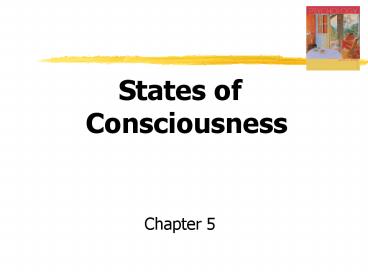States of Consciousness - PowerPoint PPT Presentation
1 / 18
Title:
States of Consciousness
Description:
'paradoxical sleep' muscles are generally relaxed, but other body systems are active ... large, slow waves of deep sleep. Hallucinations. false sensory experiences ... – PowerPoint PPT presentation
Number of Views:148
Avg rating:3.0/5.0
Title: States of Consciousness
1
- States of Consciousness
- Chapter 5
2
(No Transcript)
3
Waking Consciousness
- Consciousness
- our awareness of ourselves and our environments
4
Sleep and Dreams
- Biological Rhythms
- periodic physiological fluctuations
- Circadian Rhythm
- the biological clock
- regular bodily rhythms that occur on a 24-hour
cycle, such as of wakefulness and body temperature
5
Premenstrual Syndrome
3
Recalled mood is worse than earlier reported
Negative mood score
2
1
Premenstrual Menstrual Intermenstrual
Menstrual phase
Recalled mood
Actual
6
Sleep and Dreams
- REM (Rapid Eye Movement) Sleep
- recurring sleep stage
- vivid dreams
- paradoxical sleep
- muscles are generally relaxed, but other body
systems are active - Sleep
- periodic, natural, reversible loss of
consciousness
7
Sleep and Dreams
- Measuring sleep activity
8
Brain Waves and Sleep Stages
- Alpha Waves
- slow waves of a relaxed, awake brain
- Delta Waves
- large, slow waves of deep sleep
- Hallucinations
- false sensory experiences
9
Stages in a Typical Nights Sleep
10
Stages in a Typical Nights Sleep
11
Sleep Deprivation
- Effects of Sleep Loss
- fatigue
- impaired concentration
- depressed immune system
- greater vulnerability to accidents
12
Sleep Deprivation
13
Sleep Disorders
- Insomnia
- persistent problems in falling or staying asleep
- Narcolepsy
- uncontrollable sleep attacks
- Sleep Apnea
- temporary cessation of breathing
- momentary reawakenings
14
Night Terrors and Nightmares
- Night Terrors
- occur within 2 or 3 hours of falling asleep,
usually during Stage 4 - high arousal-- appearance of being terrified
15
Dreams Freud
- Dreams
- sequence of images, emotions, and thoughts
passing through a sleeping persons mind - hallucinatory imagery
- discontinuities
- incongruities
- delusional acceptance of the content
- difficulties remembering
16
Dreams Freud
- Sigmund Freud--The Interpretation of Dreams
(1900) - wish fulfillment
- discharge otherwise unacceptable feelings
- Manifest Content
- remembered story line
- Latent Content
- underlying meaning
17
Dreams
- As Information Processing
- helps facilitate memories
- REM Rebound
- REM sleep increases following REM sleep
deprivation
18
Sleep Across the Lifespan
19
Hypnosis
- Hypnosis
- a social interaction in which one person (the
hypnotist) suggests to another (the subject) that
certain perceptions, feelings, thoughts, or
behaviors will spontaneously occur - Posthypnotic Amnesia
- supposed inability to recall what one experienced
during hypnosis - induced by the hypnotists suggestion
20
Hypnosis
- Unhypnotized persons can also do this
21
Hypnosis
- Orne Evans (1965)
- control group instructed to pretend
- unhypnotized subjects performed the same acts as
the hypnotized ones - Posthypnotic Suggestion
- suggestion to be carried out after the subject is
no longer hypnotized - used by some clinicians to control undesired
symptoms and behaviors
22
Hypnosis
- Dissociation
- a split in consciousness
- allows some thoughts and behaviors to occur
simultaneously with others - Hidden Observer
- Hilgards term describing a hypnotized subjects
awareness of experiences, such as pain, that go
unreported during hypnosis
23
Explaining Hypnosis
24
Drugs and Consciousness
- Psychoactive Drug
- a chemical substance that alters perceptions and
mood - Physical Dependence
- physiological need for a drug
- marked by unpleasant withdrawal symptoms
- Psychological Dependence
- a psychological need to use a drug
- for example, to relieve negative emotions
25
Dependence and Addiction
- Tolerance
- diminishing effect with regular use
- Withdrawal
- discomfort and distress that follow discontinued
use
26
Psychoactive Drugs
- Depressants
- drugs that reduce neural activity
- slow body functions
- alcohol, barbiturates, opiates
- Stimulants
- drugs that excite neural activity
- speed up body functions
- caffeine, nicotine, amphetamines, cocaine
27
Psychoactive Drugs
- Hallucinogens
- psychedelic (mind-manifesting) drugs that distort
perceptions and evoke sensory images in the
absence of sensory input - LSD
28
Psychoactive Drugs
- Barbiturates
- drugs that depress the activity of the central
nervous system, reducing anxiety but impairing
memory and judgement
29
Psychoactive Drugs
- Opiates
- opium and its derivatives (morphine and heroin)
- opiates depress neural activity, temporarily
lessening pain and anxiety
30
Psychoactive Drugs
- Amphetamines
- drugs that stimulate neural activity, causing
speeded-up body functions and associated energy
and mood changes
31
Cocaine Euphoria and Crash
32
Psychoactive Drugs
- Ecstasy (MDMA)
- synthetic stimulant and mild hallucinogen
- both short-term and long-term health risks
- LSD
- lysergic acid diethylamide
- a powerful hallucinogenic drug
- also known as acid
- THC
- the major active ingredient in marijuana
- triggers a variety of effects, including mild
hallucinations
33
Psychoactive Drugs
34
Trends in Drug Use
35
Perceived Marijuana Risk
36
Near-Death Experiences
- Near-Death Experience
- an altered state of consciousness reported after
a close brush with death - often similar to drug-induced hallucinations
37
Near-Death Experiences
- Dualism
- the presumption that mind and body are two
distinct entities that interact - Monism
- the presumption that mind and body are different
aspects of the same thing































